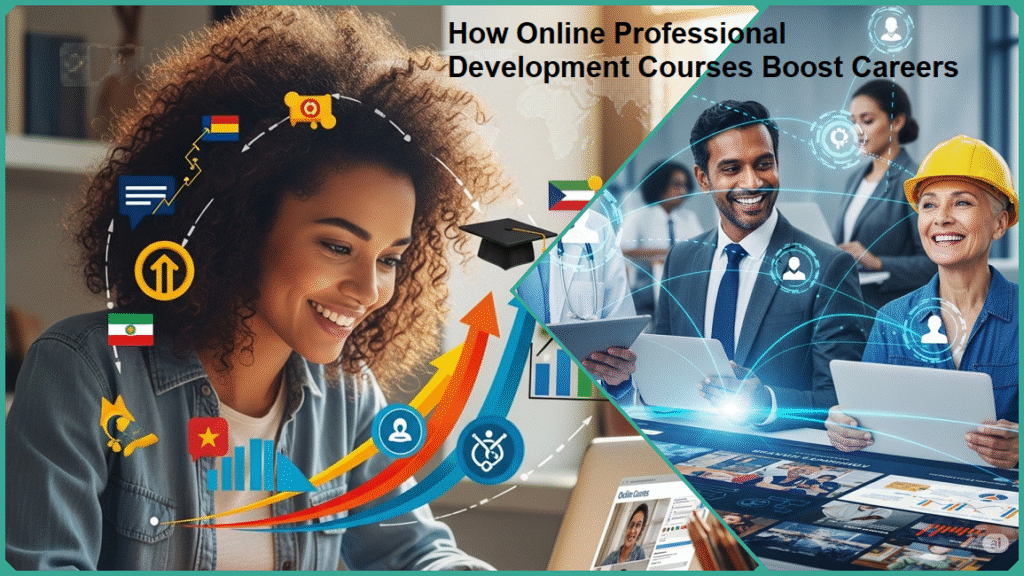How Online Professional Development Courses Boost Careers
Estimated reading time: 22 minutes
Continuous learning isn’t merely an option—it’s essential in today’s fast-paced and ever-changing professional landscape. The workforce has become significantly more dynamic and competitive than ever before, with constant advancements in new technologies and rapidly evolving job requirements that are continuously reshaping industries across the globe.
For ambitious professionals, job seekers, and entrepreneurs alike, staying relevant and competitive means making a consistent commitment to continually acquiring new knowledge, developing fresh skills, and adapting to the changing environment. Traditional education routes often aren’t feasible due to time, cost, or geographical constraints, particularly in developing economies.

This is precisely where online professional development courses have truly emerged as a revolutionary and game-changing avenue for learning and growth. These courses provide an accessible, highly flexible, and cost-effective solution that empowers individuals at every stage of their career journey.
Whether someone is just starting, looking to advance, or seeking to pivot into a new field, these courses enable them to sharpen their skills, significantly enhance their employability, and confidently seize exciting new professional opportunities that come their way.
This blog post explores precisely how online professional development courses boost careers and why they’re becoming the preferred choice for millions of learners worldwide, including those in emerging markets and remote areas. Understanding their significance will clearly illustrate why investing in online learning is a strategic move for your career.
Key Concepts and Theories in Online Professional Development Courses
Online professional development courses are digitally delivered learning programs designed to enhance an individual’s professional skills and knowledge in targeted areas. Their main objective is to equip learners with practical, job-ready competencies that improve career prospects.
These courses typically culminate in certificates or credentials that serve as verifiable proof of proficiency and dedication to continuous learning, valued by employers globally. The content of these online professional development courses spans a broad spectrum.
On the technical side, courses may cover topics like data analysis, coding, artificial intelligence marketing, digital marketing strategies, or cybersecurity—skills increasingly critical across industries. Conversely, many courses focus on soft skills essential for leadership and team success, such as communication, project management, and problem-solving.
Commonly, these online professional development courses employ a multimodal approach to maximize engagement and retention. Learners interact with video lectures, interactive quizzes, and real-world assignments, often enhanced by community discussions or peer collaboration, fostering a dynamic and supportive learning environment.
Three fundamental and widely recognized learning theories form the foundation that underpins and supports the effectiveness and success of these online professional development courses:
- Adult Learning Theory (Andragogy): This approach places a strong emphasis on self-directed learning, recognizing that adults take an active role in their educational journey. It highlights problem-centered learning methods, where adult learners are motivated to engage with material that directly addresses their current professional challenges and practical needs. Adults typically prefer to focus on content that is immediately applicable to their work or life situations, making relevance a key factor in their learning process.
- Experiential Learning: Learners develop valuable skills by engaging in active, hands-on practice combined with thoughtful reflection. This approach allows them to deeply understand and apply concepts in real-world contexts. Online assignments and projects are designed to effectively simulate this process, providing meaningful opportunities for learners to practice and refine their abilities in a practical, immersive way.
- Constructivism: Knowledge is actively built and developed through continuous interaction, meaningful collaboration, and thoughtful reflection. This approach is strongly encouraged in online course environments, particularly through the use of discussion forums and group tasks, where learners engage deeply with the material and with each other to construct understanding collectively.
Together, these interconnected concepts work synergistically to guarantee that online professional development courses are designed to be not only highly informative but also practical in their application, while remaining flexible and adaptable to meet the diverse needs and varying learning styles of a wide range of learners.
How Online Professional Development Courses Boost Careers
Online professional development courses have completely transformed the way individuals improve their skills and move forward in their careers. These courses offer an accessible, flexible, and cost-effective route for professionals from a wide range of industries to remain competitive and relevant in an ever-evolving job market.
In the following paragraphs, we will take an in-depth look at the various ways these courses contribute to career growth and professional advancement.
Enhancement of Skills and Knowledge
Online courses empower learners to master in-demand skills relevant to today’s evolving industries. Whether it’s cybersecurity, artificial intelligence, digital marketing, or financial literacy, these online professional development courses deliver up-to-date, focused content that equips professionals with practical expertise.
For example, a mid-career finance professional who completes a course in data analytics can qualify for roles involving financial modeling or strategic decision-making, thus opening career doors previously inaccessible.
Importantly, professional certifications earned online serve as validated proof of proficiency and a commitment to continuous learning—qualities highly prized by employers. The ability to quickly obtain these credentials without disrupting work schedules also helps learners stay current in fields where technology and best practices change rapidly.
Flexibility and Accessibility
One of the most significant advantages of online professional development is its flexibility. Learners can study anytime and from anywhere, an essential feature for those balancing work, family, and personal commitments. This flexibility is especially transformational for individuals in remote areas or emerging markets, including many African countries, where access to traditional, high-cost education is limited.
By breaking down geographical and time barriers, online courses democratize learning, enabling individuals without formal degrees or extensive prior education to gain practical skills tailored to their career goals. This accessibility fosters inclusivity and broadens participation in professional development globally.
Cost-Effectiveness
Compared to in-person degrees and training, online courses significantly reduce costs by eliminating expenses such as commuting, housing, and printed materials. Many platforms offer free or very affordable certification courses, which makes professional growth financially achievable for a wider audience.
This high level of cost-effectiveness provides learners with the valuable opportunity to explore a wide range of specializations or make significant career pivots without the burden of incurring substantial debt or facing financial strain.
As a result, this approach significantly amplifies the potential opportunities available for lifelong learning and enhances career agility, enabling individuals to adapt and grow in an ever-changing job market with greater ease and confidence.
Development of Digital and Soft Skills
Participation in online courses naturally builds digital literacy—a core competency in modern workplaces. Navigating learning management systems, engaging in virtual collaboration tools like Zoom or Microsoft Teams, and managing content fosters adaptability and tech fluency.
Simultaneously, numerous courses focus on developing soft skills critical to career progression, such as leadership, communication, time management, and project management. These skills are often decisive for moving into senior or strategic roles, with employers increasingly valuing this blend of technical and interpersonal capabilities.
Networking and Global Perspectives
Online courses bring together learners from diverse geographies and industries, fostering unique networking opportunities that traditional classrooms may lack. Through webinars, forums, group projects, and mentorship programs, students connect, share insights, and build professional relationships.
For instance, an African entrepreneur in Kenya studying an online business course can collaborate with peers worldwide, gaining access to global perspectives and strategies that fuel innovation and business growth. These networks can lead to new career opportunities and collaborations otherwise unavailable locally.
Accelerated Career Transitions
Online professional development courses offer a fast-track path to new careers without forcing learners to pause employment. Professionals seeking to transition—such as teachers moving into data science or marketers shifting to AI applications—can gain necessary skills and certifications efficiently.
The ability to learn at one’s own pace while simultaneously managing and fulfilling work responsibilities enables greater agile career mobility, which is critical in today’s fast-paced world, where professionals often change roles, switch industries, or adapt to new career paths more frequently than ever before.
Increased Credibility and Employability
Completing online professional development courses from reputable platforms and institutions adds credibility to resumes and LinkedIn profiles. Online certifications signal to employers a candidate’s commitment to skill enhancement and professional growth.
Industry data reveals a rising trend of employer recognition for online credentials, sometimes equating their value to that of traditional degrees. Employees engaged in continuous online learning are statistically more likely to receive promotions, pay raises, and leadership opportunities.
Summary of the Benefits of Online Professional Development Courses
| Benefits | Description | Impact on Career |
|---|---|---|
| Skill Enhancement | Learning up-to-date technical and soft skills | Increased job readiness and competitive edge |
| Flexibility & Accessibility | Study anytime, anywhere without disrupting work | Balances learning with life, expands reach |
| Cost-Effectiveness | Lower costs than traditional education | Affordable ongoing learning and career shifting |
| Digital & Soft Skills Development | Builds tech proficiency plus leadership and communication skills | Prepares for senior and hybrid roles |
| Networking and Global Reach | Interaction with global peers and mentors | Opens new opportunities and collaborations |
| Accelerated Career Transitions | Enables career switches without downtime | Faster entry into new fields |
| Credibility & Employability | Recognized certifications boost professional image | Higher chances of promotion and salary growth |
For anyone aiming to boost their career, especially ambitious professionals, job seekers, entrepreneurs, and lifelong learners, online professional development courses offer a strategic, practical, and accessible solution. They remove traditional barriers and equip learners to thrive in a highly competitive global market.
Platforms such as Alison, Coursera, and edX offer a wide range of robust and comprehensive options to help you begin or continue your educational journey at your own pace. Enrolling in your first course today can be a truly transformative and empowering step toward reaching and surpassing your professional and career goals.
Current Trends and Developments in Online Professional Development
The professional development landscape has undergone a significant and rapid transformation, with online learning emerging as the primary force driving global upskilling initiatives. This shift is reshaping how both individuals and organizations approach the acquisition of critical skills needed to succeed and excel in an increasingly dynamic and competitive workforce environment.
Below, we explore the key trends that are set to shape and define the future of online professional development in the year 2025 and beyond.
Micro-Credentials and Nanodegrees
Micro-credentials and nanodegrees have experienced a significant surge in popularity in recent years, providing learners with short, highly targeted certifications designed to address very specific skill gaps in various fields. Unlike traditional degrees, which often require several years of study and cover broad subject areas, these bite-sized programs are:
- Focused on workplace-relevant skills.
- Quick to complete (often in weeks rather than years).
- Stackable, allowing learners to build a tailored portfolio for their career goals.
- Recognized by employers who value evidence of current, in-demand expertise.
Professionals have the ability to quickly showcase their competency, adapt and pivot to new and emerging fields, and maintain a competitive edge in the ever-evolving job market by obtaining these valuable certifications. These credentials not only validate their skills but also open doors to new career opportunities and growth.
AI-Powered Personalized Learning
Advancements in artificial intelligence have ushered in a remarkable new era of highly personalized learning experiences. Modern online educational platforms now:
- Analyze user data to identify strengths, weaknesses, and preferences.
- Adapt content in real-time to match individual learning paths.
- Provide instant feedback, dynamic quizzes, and recommendations tailored to the learner’s goals.
This tailored customization approach not only significantly accelerates the mastery of essential skills but also greatly enhances engagement levels and improves retention rates among professionals across every stage of their careers.
Integration with Employer Training
Increasingly, a growing number of businesses are actively partnering with online education providers to better align their workforce training programs with the rapidly evolving needs and demands of their organizations. Key aspects of these partnerships include:
- Customizable content to fit immediate business challenges.
- On-demand training is accessible anytime, anywhere.
- Performance tracking and analytics for HR and managers.
- Encouragement of lifelong learning to boost retention and productivity.
Examples from leading companies demonstrate significantly reduced training costs, notably higher employee engagement levels, and much greater organizational agility when e-learning solutions are thoughtfully integrated into comprehensive professional development strategies.
Mobile Learning
Mobile-first learning has increasingly become the prevailing approach, transforming the landscape of education by making professional development opportunities readily accessible from virtually anywhere at any time. This shift ensures that individuals can engage in continuous learning without being confined to traditional settings. Some of the most significant and impactful developments in mobile learning include:
- Apps and responsive web platforms optimized for smartphones and tablets.
- Microlearning modules—short, focused lessons—ideal for busy schedules.
- Offline capabilities, allowing learning without continuous internet access.
- Gamified, interactive content that boosts motivation and engagement.
Mobile learning is significantly empowering professionals working in remote and underserved regions by providing them with unprecedented access to participate fully in global knowledge economies. This innovative approach is effectively breaking down long-standing barriers related to geographic location and inadequate infrastructure, enabling individuals to engage with valuable educational resources and professional development opportunities regardless of where they are situated.
Focus on Emerging Technologies
The most in-demand skills currently dominating the job market—and consequently the most sought-after topics for online courses—are those that align closely with the latest technological innovations and advancements emerging across various industries:
- Artificial Intelligence (AI) and Machine Learning (ML): Building and deploying models, natural language processing, and automation.
- Data Science and Analytics: Harnessing big data for business intelligence.
- Cybersecurity: Protecting digital assets against evolving threats.
- Cloud Computing, Blockchain, and IoT: Foundational technologies transforming entire industries.
- Digital Transformation: Strategies for leading businesses through tech-driven change.
The demand for these valuable skills is rapidly increasing across a wide range of industries and sectors, as professionals from various backgrounds are keen to reskill or enhance their existing skill sets. They are turning to online learning platforms that can swiftly adapt and respond to the latest developments and emerging trends in their fields. This growing trend highlights the importance of continuous learning and flexibility in today’s fast-paced job market.
Summary of the Current Trends and Developments in Online Professional Development
| Trend | Key Benefit | Professional Impact |
|---|---|---|
| Micro-credentials & Nanodegrees | Fast, focused skills, stackability, and employer recognition | Rapid upskilling, flexible career pivots |
| AI-Personalized Learning | Custom learning paths, instant feedback, and higher engagement | Faster, more effective mastery and higher motivation |
| Employer Integration | Aligned training with business needs, lower costs | Improved productivity, retention, and relevance |
| Mobile Learning | Anytime, anywhere access, offline/online capabilities | Inclusion for remote, busy, or underserved learners |
| Focus on Emerging Tech | Relevance to in-demand fields, job market alignment | Greater employability in future-facing roles |
These dynamic trends—micro-credentials, AI-driven personalization, employer integration, mobile-first experiences, and a focus on emerging technologies—are fundamentally transforming online professional development. They promise even greater impact, accessibility, and career growth for professionals worldwide, especially as organizations and individuals embrace a culture of continuous learning.
By effectively leveraging these cutting-edge innovations, you can successfully future-proof your valuable skills and ensure that you remain highly agile and adaptable in an ever-changing and continuously evolving workforce environment.
How to Choose and Leverage Online Professional Development Courses
Choosing the most suitable online professional development courses—and thoughtfully applying the knowledge and skills you gain from them—can significantly boost and accelerate your career progression. To assist you in making well-informed decisions and getting the greatest possible advantage from these learning opportunities, here is a detailed step-by-step guide designed to help you navigate the process effectively and strategically.
Identify Your Career Goals
Before enrolling in any course, it is very important to take some time to carefully clarify and define your specific career objectives and goals. Understanding what you want to achieve in your professional life will help you:
- Assess your current skills and identify gaps that could hinder your progress.
- Set clear short-term and long-term goals—do you need a specific certification, a new technical ability, or stronger leadership skills?
- Research industry trends and in-demand skills for your target roles, using credible platforms like LinkedIn, Glassdoor, or industry reports.
Tip: Take a moment to write down your primary goal and then carefully choose courses that directly align with and support that goal, ensuring your course selection effectively contributes to your overall success.
Verify the Credibility of Course Providers
Not all online courses hold the same level of value or credibility. To make certain that the time and effort you invest leads to meaningful and tangible career advantages:
- Choose established, reputable platforms such as Alison, Coursera, or edX, which partner with leading universities and industry experts.
- Check for well-reviewed instructors, accreditation status, and partnerships with recognized organizations.
- Look for courses that issue certificates or digital badges—especially those that are widely recognized by employers in your field.
Consider Flexibility and Learning Format
Both your professional and personal life can be quite busy and demanding, so it is important to prioritize and choose courses that best fit your specific needs and schedule:
- Review course formats—self-paced versus instructor-led, mobile-friendly access, part-time versus full-time options.
- Determine if the content is offered in multiple formats: video, text, quizzes, or hands-on projects.
- Check language options and technical requirements to ensure you won’t face accessibility obstacles.
Tip: Flexible, on-demand courses are especially ideal for individuals who have irregular work hours, unpredictable schedules, or family obligations that require them to manage their time carefully. These courses allow you to learn at your own pace and on your own time, making it much easier to balance your educational goals with your personal and professional responsibilities.
Use Networking Opportunities
Online learning isn’t just about acquiring knowledge—it serves as a powerful and dynamic venue for networking opportunities that can significantly enhance your personal and professional growth. Through virtual classrooms, discussion forums, and collaborative projects, learners have the chance to:
- Actively participate in forum discussions, group projects, webinars, and virtual events organized by the course platform.
- Connect with instructors and peers from around the world; these relationships can provide mentorship, encouragement, and even job leads.
- Share your insights, ask questions, and offer help to others—building your professional reputation.
Apply Learning Practically
To effectively transform knowledge into tangible and meaningful career achievements and results:
- Seek real-world application opportunities: volunteer for new tasks, suggest projects at work, or start freelance gigs that leverage your new skills.
- Incorporate course projects into your current job, or collaborate with classmates on capstone assignments.
- Reflect on your progress regularly and seek feedback from peers and mentors.
Track Your Progress and Build a Portfolio
Demonstrate your strong commitment to ongoing professional growth by proudly showcasing your significant achievements and accomplishments.
- Collect and organize certificates, digital badges, and completed project summaries.
- Add new skills, projects, and certifications to your LinkedIn profile and CV—emphasize achievements with tangible job relevance.
- Maintain a digital portfolio or website displaying your best work and certificates.
Highlighting these milestones not only reflects your dedication to continuous improvement but also reinforces your proactive approach to advancing your skills and expertise within your field. This practice clearly illustrates your unwavering commitment to personal and professional development over time.
Summary of How to Choose and Leverage Online Professional Development Courses
| Step | Action | Why It Matters |
|---|---|---|
| Identify Career Goals | Analyze skills gap; set clear objectives | Ensures learning aligns with ambitions |
| Verify Credibility | Choose reputable providers and certifications | Maximizes employer recognition |
| Flexibility & Format | Pick formats that fit your life and learning style | Promotes course completion |
| Networking Opportunities | Engage in forums, webinars, and group projects | Expands professional network |
| Apply Learning Practically | Use new skills in real-world roles/projects | Deepens mastery and job relevance |
| Track & Showcase Progress | Share certificates/projects on LinkedIn, CV, portfolio | Boosts career visibility and employability |
Key Takeaways
- Strategic course selection and active engagement unlock the full value of online professional development.
- Reputable platforms, practical application, and portfolio building multiply your chances of career advancement.
- Consistently update your goals, skills, and professional profile as you learn and grow.
By carefully following these detailed steps, you will not only be able to select the most suitable and beneficial courses that align perfectly with your career goals, but you will also be able to effectively leverage every opportunity available. This approach will help you build a stronger, more impressive, and highly visible professional future that stands out in your industry.
Recommended Learning Platforms for Online Professional Development
Choosing the right learning platform is absolutely crucial if you want to maximize your professional growth and successfully achieve your long-term career goals. Selecting the best platform can make a significant difference in how effectively you acquire new skills and knowledge.
Here’s a detailed overview of some of the top platforms that are widely renowned for their exceptional quality, strong credibility, and impressive versatility in catering to a broad range of learning needs:
Alison
- Wide Range of Courses: Alison offers thousands of free and paid professional development courses across industries, including business, IT, health, marketing, and languages.
- Certification: Most courses offer free learning options, while digital certificates or diplomas are available for a fee, making valuable credentials accessible to a global audience.
- Affordability & Accessibility: Alison’s focus on affordability allows learners in emerging markets and remote areas to gain recognized skills without the financial burden of traditional education.
- Flexible Learning: Courses are self-paced, allowing you to learn anytime, anywhere.
Coursera and edX
- University-Backed Credentials: Both platforms partner with leading universities and organizations (like Stanford, Harvard, and Google) to offer high-quality, academically rigorous courses.
- Certificates and Degrees: Learners can pursue verified certificates, professional certificates, or even full degree programs online. These credentials are recognized by employers worldwide.
- Broad Subject Areas: Topics range from data science, computer programming, and business management to arts, health, and humanities.
- Financial Aid: Many courses offer free access or financial aid options to promote inclusivity.
LinkedIn Learning
- Business, Tech, & Creative Focus: LinkedIn Learning excels in offering courses for business strategy, tech upskilling, productivity tools, leadership, digital marketing, and creative skills like design or video production.
- Professional Integration: Integrates directly with your LinkedIn profile, making it easy to showcase new skills and certificates to potential employers or professional contacts.
- Personalized Recommendations: Course suggestions are tailored to your career interests and industry trends.
- Flexible Subscriptions: Access to thousands of on-demand courses with a monthly subscription, often accompanied by a free trial.
Comparison of Recommended Learning Platforms for Online Professional Development
| Platform | Key Strengths | Best For | Certification Type |
|---|---|---|---|
| Alison | Free/affordable, wide range, self-paced | Budget-conscious learners worldwide | Free/paid certificates |
| Coursera | University partners, academic rigour, and degrees | Formal credentials, deep subject expertise | Verified, degree, spec. |
| edX | Elite institutions, MicroMasters, flexible | Lifelong learners, degree seekers | Verified, MicroMasters |
| LinkedIn Learning | Business/tech/creative, networking integration | Working professionals, LinkedIn users | Skill certificates |
By carefully selecting the platform that most closely aligns with your unique needs and long-term aspirations, you can confidently embark on your professional development journey. This thoughtful choice will empower you to fully maximize your career advancement opportunities and unlock your true potential in the professional world.
FAQs
Are Online Professional Development Courses Recognized by Employers?
Employers increasingly acknowledge online certifications—especially those from well-established or accredited platforms—as credible proof of up-to-date skills and dedication to self-improvement. Many companies now factor online courses into hiring and promotion decisions, particularly when the course content aligns with industry needs or is offered by recognized organizations or universities.
How Long Do These Courses Typically Take?
The lengths of courses can vary quite significantly depending on the subject, level, and institution offering them:
- Short Courses: Some modules take only a few hours to complete.
- Micro-credentials & Certificates: Often span several weeks to a few months.
- Comprehensive Programs: Certain specializations or diploma tracks can last several months or longer, but most online professional development courses are designed for flexible, self-paced completion.
Can Online Courses Help in Switching Careers?
Online courses provide practical, foundational knowledge and recognized certifications necessary for transitioning into new fields. Whether moving from education to tech, or from administrative roles to project management, online learning allows you to gain the skills required for new career paths efficiently and often without leaving your current job.
Are Online Courses Expensive?
Generally, online courses tend to be significantly more affordable compared to traditional, in-person educational programs offered by many institutions. Numerous reputable platforms provide:
- Free Courses: With optional paid certificates.
- Low-Cost Programs: Affordable pricing for professional certificates.
- Financial Aid or Scholarships: Making advanced learning accessible to a broader audience, including those in developing economies.
How Do I Stay Motivated to Complete Online Courses?
Maintaining a high level of motivation over time can become significantly easier and more achievable when you incorporate these effective strategies into your daily routine:
- Set Clear Goals: Define specific objectives for taking each course.
- Create a Schedule: Designate regular study times, as consistency aids retention.
- Engage With Peers: Join forums, study groups, or discussion boards to gain encouragement and accountability.
- Track Progress: Celebrate milestones and reward yourself for completing course modules.
- Apply Learning Practically: Implement new skills at work or in personal projects to see immediate value, reinforcing your commitment.
Online professional development courses offer flexible, affordable, and recognized pathways to career growth and transition. With commitment and the right strategies, anyone can leverage these opportunities to enhance their employability and prospects.
In Conclusion
Online professional development courses represent a powerful catalyst for career advancement across all levels and sectors. They offer unparalleled flexibility, affordability, and accessibility, making continuous learning feasible for everyone—from young professionals aiming to gain an edge, to seasoned managers embracing new technologies, and entrepreneurs seeking growth.
By expanding skills, enhancing credibility, and opening networking channels, online courses prepare individuals for the future of work in a digitally connected, global economy. Platforms like Alison exemplify how high-quality, accessible education can empower learners worldwide, especially in emerging markets and remote regions.
Embracing online professional development is not merely a smart investment; it represents a crucial and indispensable step toward achieving long-term career success and deep personal fulfillment. By engaging in continuous learning through digital platforms, individuals can stay ahead in their fields, adapt to rapidly changing industries, and unlock new opportunities for growth and advancement.
This commitment to online education fosters both professional excellence and a sense of personal achievement that lasts throughout one’s career journey.
Discover more from Skill to Grow
Subscribe to get the latest posts sent to your email.






